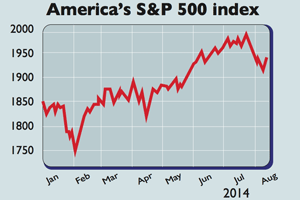Can the bulls keep going?
Headwinds have gathered in the stock markets, but it may not be enough to halt the rally.

Get the latest financial news, insights and expert analysis from our award-winning MoneyWeek team, to help you understand what really matters when it comes to your finances.
You are now subscribed
Your newsletter sign-up was successful
Want to add more newsletters?

Twice daily
MoneyWeek
Get the latest financial news, insights and expert analysis from our award-winning MoneyWeek team, to help you understand what really matters when it comes to your finances.

Four times a week
Look After My Bills
Sign up to our free money-saving newsletter, filled with the latest news and expert advice to help you find the best tips and deals for managing your bills. Start saving today!
Investors' "love affair" with shares could be heading for a "nasty break-up", says the Financial Times. America's S&P 500 has fallen by 4% from last month's record high. The pan-European and German markets are down by more than 10% taking them into official correction' territory. Is this the end of the post-2009 rally?
The lengthening list of geopolitical problems seems finally to have snapped markets out of their complacency. The worsening crisis in Ukraine, with Russia now slapping tit-for-tat sanctions on food and agricultural products from Europe, has caused the greatest worry.
"The evidence is building that Russian sanctions are starting to hit the [European] economy," reckons Jim Reid of Deutsche Bank. Russia is the European Union's third-largest trading partner behind the US and China, accounting for just under 10% of the region's trade.
MoneyWeek
Subscribe to MoneyWeek today and get your first six magazine issues absolutely FREE

Sign up to Money Morning
Don't miss the latest investment and personal finances news, market analysis, plus money-saving tips with our free twice-daily newsletter
Don't miss the latest investment and personal finances news, market analysis, plus money-saving tips with our free twice-daily newsletter
But it's not just global turmoil. "When war trumpets sound, geopolitics beats finance," says James Mackintosh in the FT. However, "the rest of the time, worry about monetary policy". Thanks to strong recent data in the US, the first interest-rate rise in America may be closer than investors had expected and that's also got them rattled.
Yet the cumulative impact of all these concerns may not be enough to derail the rally, says Fidelity's Tom Stevenson in The Sunday Telegraph. History shows that rising but low interest rates "don't need to be a problem for stock markets". Investors should see higher rates as a sign of confidence in the recovery.

Meanwhile, as Capital Economics points out, more money printing looks likely in Europe and Japan as the European Central Bank tries to prevent deflation, and Japan's central bank tries to hit its 2% inflation target.
So, even if America picks up, global markets can expect more liquidity from other sources. And if the US takes an unexpected nosedive, there will be more money printing there too.
The pattern of the last 20 years has been that when things get tough, central banks do what they can to prop up markets. This artificial rally looks set to keep gorging on steroids, and if it falters, central bankers will up the dose.
Get the latest financial news, insights and expert analysis from our award-winning MoneyWeek team, to help you understand what really matters when it comes to your finances.

-
 Should you buy an active ETF?
Should you buy an active ETF?ETFs are often mischaracterised as passive products, but they can be a convenient way to add active management to your portfolio
-
 Power up your pension before 5 April – easy ways to save before the tax year end
Power up your pension before 5 April – easy ways to save before the tax year endWith the end of the tax year looming, pension savers currently have a window to review and maximise what’s going into their retirement funds – we look at how